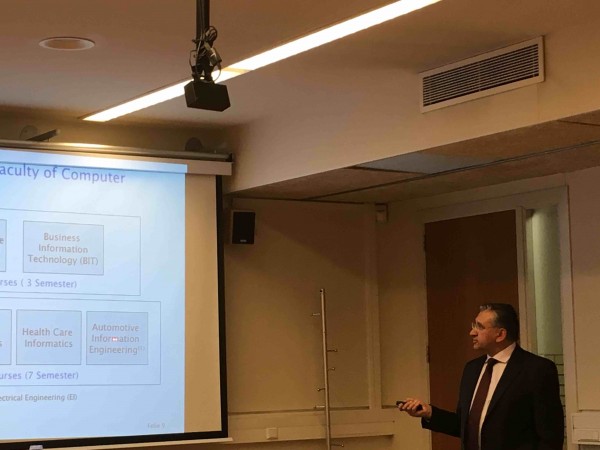Two courses for Master students on smart health care
Girona, March, 2017. The Master program 'Smart Healthcare' at the Universitat de Girona is the only accredited Master of this thematic area by the Minister of Education, Culture and Sports in Spain. Prof Dr. Ralf Seepold offered two courses on the topics of stress detection and sleep quality analysis.
The Master's program in Intelligent Technologies for Health Systems (Smart Healthcare) is, unlike other programs offered in some Spanish universities, the only official and verified by the Ministry of Education, Culture and Sport on this subject. Directed to graduates in Engineering (Informatics, Biomedical, Telecommunications, Industrial, Electronics ...), who want to expand their knowledge and focus their career path to the health sector.

Prof. Dr. Seepold also explaining the students offers at HTWG Konstanz
Short description of the courses
Stress pattern detection with a reduced set of parameters
According to the World Health Organisation (WHO), stress is recognized as a predominant disease with raising costs for treatment and rehabilitation. An increasing amount of people will face long time limitations (partially not reversible). Furthermore, it lowers the quality of life caused by diseases provoked or influenced by stress. First research results show that stress can be detected with the help of a reduced set of parameters extracted with the help of mobile and wearable devices.
Non-invasive Sleep Phase Detection
The role of sleep in humans’ life should never be undervalued, it takes almost a third of each day and it has high influence on the body and brain when restoring from fatigue. Long-term influence of poor sleeping quality can result in depressions, cardiovascular disease, diabetes, obesity, dementia etc. In parallel to well-known but very costly sleep laboratory installations and alternative approach is under investigation that allows non-invasive body monitoring with low-cost devices. The approach is supporting the prediction of the sleep stages while focusing on heartbeat, body movement and respiration.

